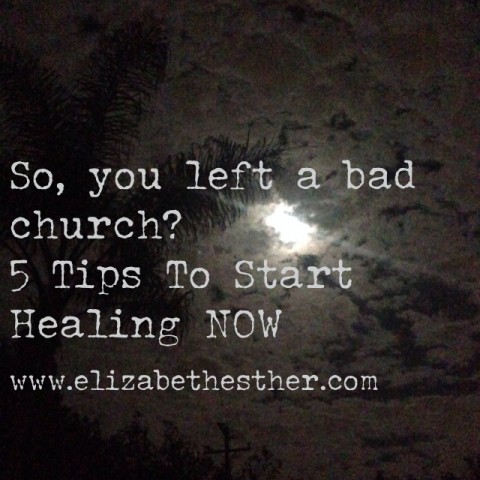So...you left an abusive church? 5 Tips to Start Healing NOW. @MarsHill #MarsHillChurch
Your pastor is hunkered down behind locked gates, his only communication with the congregation via pre-recorded video messages. Fifteen of your sister churches are closing. The church you believed in, the pastor you loved, the people you came to call brothers and sisters--it's all falling apart. With a heavy heart and after much prayer, you decide it's time to leave. You make a few phone calls. Or maybe you just disappear. Either way, a few days later you find yourself in full-blown withdrawal. You haven't felt this way since you quit cigarettes ten years ago. You feel desperate. Freaked out. Confused. Depressed. Maybe you're having nightmares. Maybe you're doubting yourself. Did you make the right decision? Is God angry with you? Friend, I'm here to tell you--you're not alone. Others have walked this path. I'm one of them. I even wrote a book about it. I'm here to help you. Let's start with your immediate future. Here are some things you can do right now to insure a full and healthy recovery...You're gonna be OK. We're all gonna be OK. xo. EE.
: : : :
1. Refrain from diving into another church. Just like leaving a bad relationship, you suddenly find yourself with a huge, empty hole in your life. The urge to fill that hole is overwhelming. Just wait. [tweetthis]The inclination to find a "rebound church" is understandable but it short-circuits the healing process.[/tweetthis] You need time to heal and recover from what you just experienced. Your soul needs rest. Go to church if you feel that will help you--but avoid becoming involved. Let yourself heal.
2. Write Down Your Experience. As time passes, it becomes increasingly difficult to remember what happened. Especially when it comes to trauma, our brains might try to "block" us from remembering what we experienced. If we don't write down what happened, it's easy to fall into nostalgia, reminiscing about all the "good times we had." Distance makes the heart grow fonder. By writing it down you remind yourself why you don't want to go back and you identify harmful patterns of behavior so you will avoid similar churches in the future.
3. Seek Support. Sometimes if our spiritual abuse was so bad, we may isolate ourselves. As someone who has done this repeatedly, I can assure you that isolation only makes things worse. It locks us in with our obsessive ruminations. This leads to resentment. We need the support of others to help us process and release our trauma. Seek support through safe ex-members. [tweetthis]The twelve-step group "Codependents Anonymous" is particularly helpful for victims of spiritual abuse.[/tweetthis] If you can afford a therapist, seek a certified professional not just a "biblical counselor." Avoid public online interaction (at least initially). Ye shall not be healed via Facebook, Twitter or blogs. Healing takes place offline. However, secret FB groups can be very helpful.
4. Change your phone number, unfriend unsafe people, move out of town. Depending on the severity of the abuse and how close you were to the inside circle, you may need to make radical changes in the interest of healing. Sometimes a total cut-off is necessary. If you are like I was, you needed to cut everyone off (save for a couple safe, trusted friend) in order to re-learn how to live. Being around people who are still involved with the abusive church or who still defend it will trigger old thought patterns and behaviors. [tweetthis]Going cold turkey on a bad church is painful, but it leads to quicker recovery. [/tweetthis]
5. Radical Self Care: You are probably burned out, disillusioned and exhausted. Take a FULL YEAR to take care of yourself before you commit to anything new. Many people don't realize that leaving an abusive church is a major life event similar to birth, death or divorce. After a major life change, we are tempted to act out in unhealthy ways. Perhaps we eat too much, drink too much, watch too much TV or become sexually promiscuous. I can guarantee you that these behaviors will only lead to more pain. Self-care is not self-indulgence. Self-care means prioritizing sleep, healthy eating and rest. Choose one thing to focus on. Perhaps start a gentle exercise routine or choose to eat healthy. Maybe give your mind a break by limiting social media use or turning off your phone. Little steps of self-care lead to big, overall changes. Whatever you choose, don't overdo it. Remember that you are vulnerable right now and the tendency is to overdo everything--even healthy things. You are learning--maybe for the first time--how to be gentle with yourself. Take your time. Go slow. It's all gonna be OK.

